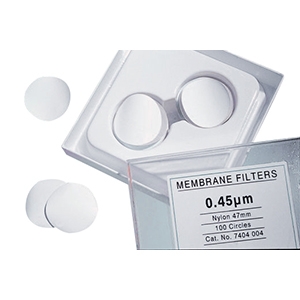High chemical compatibility
-
-

-
- SECO Part No: 12-4475-14
- Sold As:
-
Availability:

Magna™ Plain Nylon Membrane Filter, 47 mm di...
Membrane Filter, 47 mm, 0.45 µm Pore Size, Nylon, Plain, Disk Format, 65 to 125 µm Thickness, 120 µg/cm2 BSA Protein Binding, 18.94 to 36.15 ml/min/cm2 @ 10 psi Flow Rate, Sterile, HydrophilicMembrane Filter, 47 mm, 0.45 µm Pore Si More...
-
Login to View Your Price
List Price :
-
Add to cart
-
-
-

-
- SECO Part No: 66608
- Sold As:
-
Availability:

Pall Gelman HPLC Filter Disc, 0.45 Pore Size
Filter Disc, 47 mm dia, HPLC, 0.45 Pore Size, GHP Membrane, 5 mil Thickness, Useful for a Wide Range of Applications Offers Broad Chemical Resistance to Common Solvents, Naturally HydrophilicFilter Disc, 47 mm dia, HPLC, 0.45 Pore Size, More...
-
Login to View Your Price
List Price :
-
Add to cart
-
-
-

-
- SECO Part No: FLS-364-2612-OEM
- Sold As:
-
Availability:

EZFlow® Nylon Membrane Filter, 47 mm Dia, 0.22 µm ...
Membrane Filter, 47 mm Dia, 0.22 µm Pore Size, Nylon, Disc FormatMembrane Filter, 47 mm Dia, 0.22 µm Pore Size More...
-
Login to View Your Price
List Price :
-
Add to cart
-
-
-

-
- SECO Part No: 12-4561-04
- Sold As:
-
Availability:

Membrane Filter, 0.2 µm Pore Size, 13 mm dia, Nylo...
Membrane Filter, 0.2 µm Pore Size, 13 mm dia, Nylon, >50 ml/min Water Flow Rate at 5 psi, 135°C Maximum Operating TemperatureMembrane Filter, 0.2 µm Pore Size, 13 mm dia, More...
-
Login to View Your Price
List Price :
-
Add to cart
-
-
-

-
- SECO Part No: 12-4561-09
- Sold As:
-
Availability:

Membrane Filter, 0.45 µm Pore Size, 47 mm dia, Nyl...
Membrane Filter, 0.45 µm Pore Size, 47 mm dia, Nylon, >50 ml/min Water Flow Rate at 5 psi, 135°C Maximum Operating TemperatureMembrane Filter, 0.45 µm Pore Size, 47 mm dia More...
-
Login to View Your Price
List Price :
-
Add to cart
-
-
-

-
- SECO Part No: 12-4561-06
- Sold As:
-
Availability:

Membrane Filter, 0.2 µm Pore Size, 47 mm dia, Nylo...
Membrane Filter, 0.2 µm Pore Size, 47 mm dia, Nylon, >50 ml/min Water Flow Rate at 5 psi, 135°C Maximum Operating TemperatureMembrane Filter, 0.2 µm Pore Size, 47 mm dia, More...
-
Login to View Your Price
List Price :
-
Add to cart
-
-
-

-
- SECO Part No: 12-4561-08
- Sold As:
-
Availability:

Membrane Filter, 0.45 µm Pore Size, 25 mm dia, Nyl...
Membrane Filter, 0.45 µm Pore Size, 25 mm dia, Nylon, >50 ml/min Water Flow Rate at 5 psi, 135°C Maximum Operating TemperatureMembrane Filter, 0.45 µm Pore Size, 25 mm dia More...
-
Login to View Your Price
List Price :
-
Add to cart
-
-
-

-
- SECO Part No: GEH-7404-009
- Sold As:
-
Availability:

Membrane Filter, 0.45 µm Pore Size, 90 mm dia, Nyl...
Membrane Filter, 0.45 µm Pore Size, 90 mm dia, Nylon, >50 ml/min Water Flow Rate at 5 psi, 135°C Maximum Operating TemperatureMembrane Filter, 0.45 µm Pore Size, 90 mm dia More...
-
Login to View Your Price
List Price :
-
Add to cart
-
-
-

-
- SECO Part No: 12-4561-11
- Sold As:
-
Availability:

Membrane Filter, 0.8 µm Pore Size, 47 mm dia, Nylo...
Membrane Filter, 0.8 µm Pore Size, 47 mm dia, Nylon, >50 ml/min Water Flow Rate at 5 psi, 135°C Maximum Operating TemperatureMembrane Filter, 0.8 µm Pore Size, 47 mm dia, More...
-
Login to View Your Price
List Price :
-
Add to cart
-
-
-

-
- SECO Part No: 12-4561-05
- Sold As:
-
Availability:

Membrane Filter, 0.2 µm Pore Size, 25 mm dia, Nylo...
Membrane Filter, 0.2 µm Pore Size, 25 mm dia, Nylon, >50 ml/min Water Flow Rate at 5 psi, 135°C Maximum Operating TemperatureMembrane Filter, 0.2 µm Pore Size, 25 mm dia, More...
-
Login to View Your Price
List Price :
-
Add to cart
-
-
-

-
- SECO Part No: 12-4561-07
- Sold As:
-
Availability:

Membrane Filter, 0.45 µm Pore Size, 13 mm dia, Nyl...
Membrane Filter, 0.45 µm Pore Size, 13 mm dia, Nylon, >50 ml/min Water Flow Rate at 5 psi, 135°C Maximum Operating TemperatureMembrane Filter, 0.45 µm Pore Size, 13 mm dia More...
-
Login to View Your Price
List Price :
-
Add to cart
-
-
-

-
- SECO Part No: GEH-7402-009
- Sold As:
-
Availability:

Membrane Filter, 0.2 µm Pore Size, 90 mm dia, Nylo...
Membrane Filter, 0.2 µm Pore Size, 90 mm dia, Nylon, >50 ml/min Water Flow Rate at 5 psi, 135°C Maximum Operating TemperatureMembrane Filter, 0.2 µm Pore Size, 90 mm dia, More...
-
Login to View Your Price
List Price :
-
Add to cart
-





